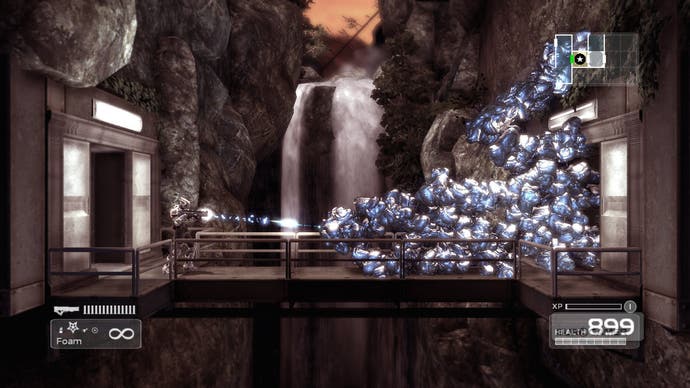Shadow Complex
There's something following me.
Every time you find a new tool for your arsenal you not only widen your choices and improve your chances in combat, but also expand your playground, doubling the sense of satisfaction and achievement that comes with each power-up. The emphasis is on completism, not only in visiting every square of the map, but also in collecting every item hidden in the complex's myriad offshoots. These hidden upgrades generally increase the efficiency of your suit, or up the number of grenades or missiles you can carry, bonuses that, at least on the default difficulty level, aren't crucial to success. However, knowing that you have three more key cards to find before you can unlock the secret vault in the depths of the base ensures that every vent and manhole is diligently checked nonetheless.
There's a sense in which an underground military bunker is never going to be as exciting a location as, say, Symphony of the Night's living gothic fortress. Few would argue that these acres of studded aluminium, crates and ventilation shafts lack the diversity of the game's inspirations. But where possible, Epic has attempted to theme areas to give the player a sense of geography, even using coloured lighting to bring character to what otherwise might become indistinguishable. The identikit soldiers you must face, all of whom look and behave in similar ways, undermine these efforts. Even the boss fights that take place in the larger warehouse rooms fail to inspire after their initial impact, the Metal Gear bipedal robot-style designs too familiar to ignite much fear or passion.

By the end of the game the range of possible interactions is dizzying. In addition to a triple jump, Fleming also sports a grappling hook, an incongruous Mario stomp for crushing enemies and a 'friction dampener' ability that sends him into Sonic-style high-speed dash through crates, up walls, along ceilings and even across water. The huge palette of moves reinforces the sense of Fleming's transformation from ordinary citizen to bionic agent and, by the end of the game, there's a palpable sense that the complex is too small to contain his enormous power. Perhaps for this reason the game's ending is a little underwhelming. There's a weak stab at a Symphony of the Night-style reveal, but it lacks punch. Nevertheless, returning to mop up any missing items in the quest for 100 per cent completion is a challenge too compelling to resist, something that speaks volumes for the game's effectiveness as a whole.
At well over 800MB, we're a far cry from Microsoft's original vision of sub-50MB entertainment snacks on Xbox Live Arcade. But despite this substantial bulk, Shadow Complex would never have been made were it not for the evolution of the download service and the growth of its limits. It's too slim and risky a prospect for a contemporary boxed release, yet too broad and ambitious for a quick fix.
The result is a glorious 3D reimagining of the Metroidvania style of game, at once reverent of its references, yet also eager to better their achievements. In some areas it meets this tall order, in others it falls a little short. Nevertheless, it's a game that will delight gamers old enough to recognise the classics it celebrates, while captivating those oblivious to its inspirations. Its inevitable success in the coming weeks and months could even kick-start the genre. Drop a stone into this game and the splash may never echo back. Its significance might just be unfathomable.









